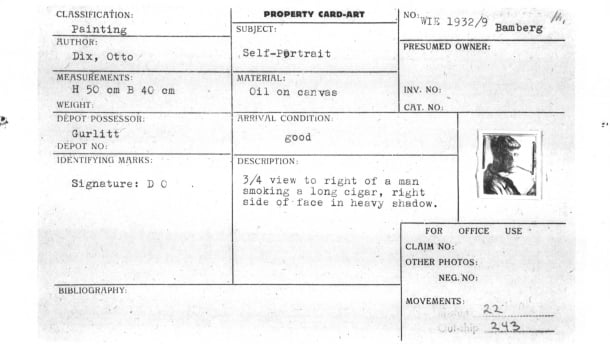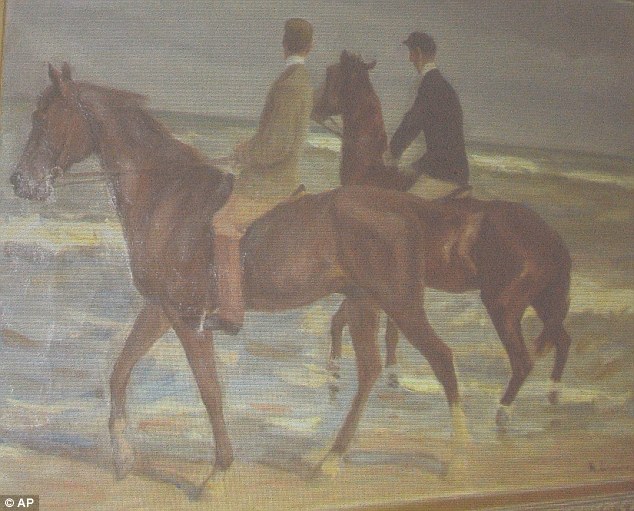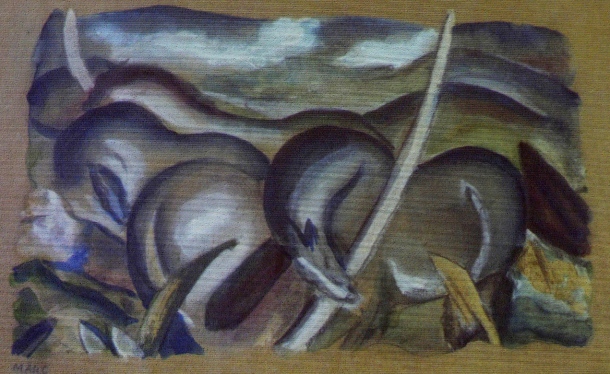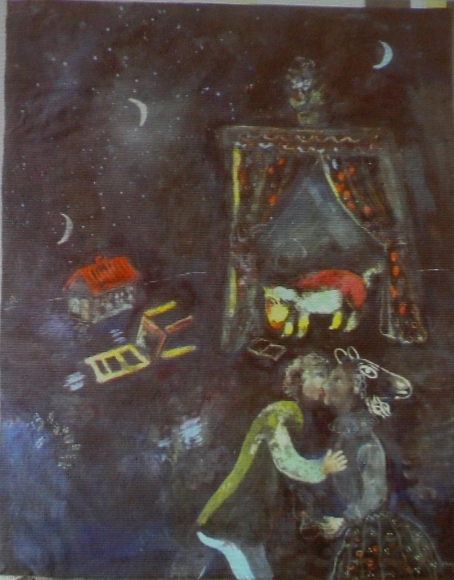The U.S. District Court for the Southern District of New York has dismissed claims for ownership of Madame Soler by Pablo Picasso, currently at the Pinakothek der Moderne in Munich. Just as the relevance of Judge Jed Rakoff’s comments over another art restitution case brought by the heirs of Paul von Mendelssohn Bartholdy unexpectedly came to the fore recently, Judge Rakoff’s decision is now the most recent in a line of frustrations for the heirs of Mendelssohn Bartholdy, a victim of Nazi persecution in Berlin in the 1930s. The ramifications of this case may be fairly narrow, however, as the case was premised on allegations of specific transactions in New York rather than general allegations about the conduct of Germany. The claimants could appeal, or perhaps turn to the Limbach Commission if they could be heard (the Pinakothek is a subdivision of Germany for jurisdictional analysis, but it’s unclear at first blush if the Commission would view this claim as within its province).
Claims by Mendelssohn Bartholdy Heirs over Picasso "Madame Soler" Dismissed, Court Finds No FSIA Jurisdiction After Evidentiary Hearings
Topics: Paul von Mendelssohn Bartholdy, Berlin, commercial activity exception, Cornelius Gurlitt, Florence Kesselstatt, Judge Jed Rakoff, Halldor Soehner, Saint-Jean-Cap-Ferrat, Julius Schoeps, Upper East Side, Prussia, Max Liebermann, Night Café, Gurlitt Collection, Foreign Sovereign Immunities Act, Preussen, France, State Paintings Collection, Madame Soler, Museum of Modern Art, Edelgard von Lavergne-Peguilhen, Van Gogh, Munich, Justin K. Thannhauser, FSIA, expropriation exception”, Nazi persecution, Boy Leading a Horse, Restitution, David Toren, Bayerische Staatsgemäldesammlung, Bavarian State Ministry for Education and Culture, Free State of Bavaria, World War II, Foreign Sovereign Immunities, Pinakothek der Moderne, Bayerisches Staatsministerium für Bildung und Kult, Bundesländer, Altmann v. Republic of Austria, Freistaat Bayern, Le Moulin de la Galette, Kurt Martin, München, Pablo Picasso, Federal Republic of Germany, Limbach Commission, Wissenschaft und Kunst
The Next Gurlitt? Records from Weinmüller Auction House Made Available Online
Among the many legacies of the Gurlitt saga is a renewed focus on the importance of Nazi-approved art dealers like Karl Haberstock to the expropriation, outlawing, and re-sale of art either owned by Jewish collectors or which was thematically disapproved by the Nazi state. Relatedly, it has served as a reminder of the often cursory review that many of these men received after the war, and the acceptance of their proffered explanations, like those of Hildebrand Gurlitt, that “everything was destroyed in a bombing attack.” Now, the German Central Institute for Art history is set to make public the records of Adolf Weinmüller and his eponymous auction house (later renamed Neumeister).
Topics: Meike Hopp, Schwabinger Kunstfund, Was einmal war, Hildebrand Gurlitt, Cornelius Gurlitt, Zentralinstitut für Kunstgeschichte, Lost Art Database, Schwabinger Taskforce, Gurlitt Task Force, Nazi-looted art, Gurlitt Collection, Karl Haberstock, Kende, Entartete Kunst, Munich, Restitution, Wien, World War II, degenerate art, www.lostart.de, München, Adolf Weinmüller, Neumeister Auction House, Aryanized, Sophie Lille, Unser Wien ‘Arisierung’ auf Österreich, Nazi Raubkunst, Vienna, Tina Walzer
Secret Witness Contradicted Hildebrand Gurlitt’s Claim to Monuments Men that His Art was Burned in Dresden
From Dresden to Aschbach to Düsseldorf—New Scholarship in U.S. Archives Traces Hildebrand Gurlitt at War’s End, Could Affect Cornelius Gurlitt’s Claim to Good Faith Ownership
The Main Post has an article today (in German) by Christine Jeske tracing the late-war and post-war trajectory of Hildebrand Gurlitt and his now-infamous collection. The article is fascinating, and sheds considerable light on how the collection came through the war and how Gurlitt evaded greater scrutiny that might have revealed the trove’s whereabouts earlier. It also puts into context any claim Cornelius Gurlitt might now have to argue he took possession of the paintings from his father unaware of their provenance—what will be a critical argument, particularly if yesterday’s Cultural Property Restitution Law proposal by Bavaria becomes federal law in German.
Topics: Wiesbaden, Cultural Property Restitution Law, veschollene Kunst, Franken, Franconia, Hildebrand Gurlitt, Cornelius Gurlitt, George Clooney, Erik Berger, Augsburg, Dresden, Nuremberg, Fall Gurlitt, Monuments Men, Gurlitt Collection, Karl Haberstock, Kunstverein, Entartete Kunst, Munich, Heiner Dikreiter, Beutekunst, Freiherr Gerhard von Pölnitz, Bavaria, Kulturgut-Rückgewähr-Gesetz, Nürnberg, Düsseldorf, Schlüsselfeld, Monuments Fine Arts and Archives, Gemäldegalerie Dresden, Christine Jeske, Walter Paech, degenerate art, Städtische Galerie, München, Main Post, Karl and Magdalene Haberstock Foundation, Raubkunst, Verjährung, Nazi Raubkunst, Aschbach
Bavaria Proposes Cultural Property Restitution Act, Heads to Berlin for Federal Approval
As reported yesterday, the government of Bavaria has moved ahead with a proposal to amend the statute of limitations over art claims like those arising out of the Gurlitt find in Schwabing/Munich. The “Draft law for the exclusion of limitations on claims for misappropriated cultural property, particularly from the Nazi era (Cultural Property Restitution Law)” would bar the assertion of a statute of limitations where the current possessor does not hold the property in good faith. The draft is now publicly available, here (albeit in German). The proposal is not limited to Bavaria, rather, it is for consideration by Germany’s federal; parliament in Berlin (first the upper chamber, or Bundesrat, followed by the Bundestag).
Topics: Berlin, Ministerin für Justiz und Kultur, Cultural Property Restitution Law, veschollene Kunst, Schwabinger Kunstfund, Cornelius Gurlitt, Gurlitt Task Force, Fall Gurlitt, Gurlitt Collection, Kulturgut, Entartete Kunst, Declaration of the Federal Government the Länder a, Munich, Beutekunst, Schwabing, Bundestag, Bundesrat, Bavaria, Kulturgut-Rückgewähr-Gesetz, degenerate art, Freistaat Bayern, Justizminister, München, Raubkunst, Verjährung, Winfried Bausback
Gurlitt Vows to Fight for Art Collection, Possible Limitations Under German Law Still Unclear. Does Austria Have Say?
Der Spiegel conducted a face to face interview with Cornelius Gurlitt that was published over the weekend, addressing his intentions about the 1,400 artworks connected to Nazi looting. Most striking was Gurlitt’s declaration with regard to the artworks seized by Bavarian tax authorities “I will give nothing back willingly.” The highlights of the interview, available in both German and English (the fuller version only in print, in German), ranges from discussing Gurlitt’s reclusive existence, to his perceived victimhood, to some standard-fare denialism (like that Hildebrand engaged in the commerce of “degenerate art” nearly always sold under duress or worse only in order to “save” the art).
Topics: veschollene Kunst, Cornelius Gurlitt, Schwabinger Kunstfund. Kunstfund München, Verjährungsfrist, Legal Times, prescriptive ownership, Gurlitt Collection, österreiches Recht, Bundesgerichtshof, Hildebrand Gurlit, Entartete Kunst, Nazis, Munich, Salzburg, Gurlitt, Restitution, City of Gotha et al. v. Sotheby’s et al., Statute of Limitations, Looted Art, World War II, deutches Recht, degenerate art, Austria, München, Raubkunst, German Civil Code § 221, Österreich
German Museums Join in Demands for More Information About Gurlitt; Links to the Amber Room Theorized; Dix Painting Was Not Unknown
Der Spiegel reports today (link in German) about how German museums are joining the chorus of frustration about the lack of information about the Hildebrand and Cornelius Gurlitt collection find. From this perspective, this development is not a surprise. I was speaking to an international law class last night at Sarah Lawrence College, and one of the students asked me what the reaction in Germany would be. My feeling was that sooner rather than later, the German museum community, and likely the federal government, will push for a forward-looking solution. Present-day Germany takes questions about the Holocaust quite seriously, and for this collection to have turned up in Germany is sparking an embarrassment that could lead to more decisive action. The problem right now seems to be that everyone is waiting for someone else to make the first move.
Topics: Jeu de Paume, unbekannte Meisterwerke, February 13 1945, FAZ, Focus, Hildebrand Gurlitt, Dresden firebombing, Max Fisher, Cornelius Gurlitt, S. Lane Faison, Linz Führermuseum, Munich Central Collecting Point, Monopol, Wiesbaden Collecting Point, Dresden, HARP, Reinhard Nemetz, Max Liebermann, WWII, Monuments Men, Gurlitt Collection, Max Beckmann, Otto Dix, Degenerate Art: The Fate of the Avant-Garde in Naz, Auktionshaus Lempertz, Entartete Kunst, Fine Arts and Archives Program, Nazis, Marc Chagall, Organisation Todt, Paul Klee, Entdeckung verschollener Kunst, beschlagnahmte Bilder, Dresdner Bank, Belvedere, Fritz Todt, Holocaust Art Project, Hamburg Kunstverein, MFAA, Roberts Commission, Angela Merkel, Restitution, Wien, Monuments Fine Arts and Archives, Selbstporträt, World War II, degenerate art, Erben, Raubkunst-Bildern, Portrait of Wally, Washi, Löwenbändiger, Austria, Franz Marc, Oskar Kokoschka, Washington Principles, Ernst Ludwig Kirchner, München, Pablo Picasso, Dr. Herman Voss, Museums, Kristallnacht, Riders on the Beach, Hans Posse, Nazi Raubkunst, Vienna, Alfred Weidinger, Henri Matisse, Self Portrait, Emil Nolde
Focus Turns to Hildebrand Gurlitt’s Postwar Interrogation; Cornelius Gurlitt’s Whereabouts. Belvedere Official Questions Whether Collection Was Really a Secret
Topics: Jeu de Paume, unbekannte Meisterwerke, February 13 1945, FAZ, Focus, Hildebrand Gurlitt, Dresden firebombing, Max Fisher, Cornelius Gurlitt, S. Lane Faison, Linz Führermuseum, Munich Central Collecting Point, Monopol, Wiesbaden Collecting Point, Dresden, HARP, Reinhard Nemetz, Max Liebermann, WWII, Monuments Men, Gurlitt Collection, Max Beckmann, Degenerate Art: The Fate of the Avant-Garde in Naz, Auktionshaus Lempertz, Entartete Kunst, Fine Arts and Archives Program, Nazis, Marc Chagall, Organisation Todt, Paul Klee, Entdeckung verschollener Kunst, beschlagnahmte Bilder, Dresdner Bank, Belvedere, Fritz Todt, Holocaust Art Project, Hamburg Kunstverein, MFAA, Roberts Commission, Angela Merkel, Restitution, Wien, Monuments Fine Arts and Archives, World War II, degenerate art, Erben, Raubkunst-Bildern, Portrait of Wally, Washi, Löwenbändiger, Austria, Franz Marc, Oskar Kokoschka, Washington Principles, Ernst Ludwig Kirchner, München, Pablo Picasso, Dr. Herman Voss, Kristallnacht, Riders on the Beach, Hans Posse, Nazi Raubkunst, Vienna, Alfred Weidinger, Henri Matisse, Emil Nolde
Merkel Hints at Putting Gurlitt Lists Online, Calls for Special Tribunal Are Made
Catherine Hickley reports from Berlin that the government of Chancellor Angela Merkel is looking into ways to put lists and/or photographs online concerning the Cornelius Gurlitt seizure of roughly 1,400 paintings with connections to Nazi looting. This followed heavy complaints in the first days of the revelation, that the government had failed to identify what has been found. The biggest question remains why this remained a secret for roughly two years since the discovery. Merkel’s government claimed yesterday it learned of the find only in the last few months.
Topics: Stephanie Barron, Jeu de Paume, unbekannte Meisterwerke, Focus, Hildebrand Gurlitt, Theo Hermsen, S. Lane Faison, Linz Führermuseum, Munich Central Collecting Point, Wiesbaden Collecting Point, HARP, Max Liebermann, WWII, Monuments Men, Alt Aussee, Gurlitt Collection, Max Beckmann, Association for Research into Crimes Against Art, Monuments, Degenerate Art: The Fate of the Avant-Garde in Naz, Albrecht Dürer, Auktionshaus Lempertz, Entartete Kunst, Fine Arts and Archives Program, Nazis, Marc Chagall, Paul Klee, Entdeckung verschollener Kunst, beschlagnahmte Bilder, Holocaust Art Project, Judge Arthur Tompkins, Roberts Commission, Angela Merkel, Restitution, 1939 Galerie Fischer auction, World War II, degenerate art, Capt. Doubinsky, Los Angeles County Musuem of Art, Erben, Raubkunst-Bildern, Altmann v. Republic of Austria, Portrait of Wally, Löwenbändiger, Marc Masurovsky, Franz Marc, Oskar Kokoschka, Ernst Ludwig Kirchner, München, Pablo Picasso, ARCA, Lawyers' Committee for Cultural Heritage Preservat, Nazi Raubkunst, Henri Matisse, Emil Nolde
New Details, More Questions Than Answers in Gurlitt Nazi-Tinged Painting Find in Munich
The Bavarian prosecutor held a press conference today to discuss the revelation this weekend in Focus that nearly 1,400 paintings had been found in the Munich apartment of Cornelius Gurlitt two years ago, after he aroused suspicion by bringing a large amount of cash back into Germany from Switzerland in 2010. This continues to shape up as the biggest restitution story in decades, perhaps ever. Among the key updates provided today by Sigfried Köble and Reinhard Nemetz, the customs official and prosecutor in charge, respectively:
Topics: Frankfurter Allgemeine Zeitung, unbekannte Meisterwerke, Focus, Hildebrand Gurlitt, Alfred Flechtheim, the Lion Tamer, Cornelius Gurlitt, Reinhard Nemetz, Anne Weber, Gurlitt Collection, Max Beckmann, Bloomberg, Otto Dix, Commission for Looted Art in Europe, Art Market Monitor, Auktionshaus Lempertz, Entartete Kunst, Meike Hoffmann, Marc Chagall, Entdeckung verschollener Kunst, beschlagnahmte Bilder, Kunsthistorikerin, Sigfried Köble, Restitution, Der Spiegel, World War II, Süddeutsche Zeitung, Erben, Raubkunst-Bildern, Löwenbändiger, München, Nazi Raubkunst
Paintings Targeted by the Nazis Found in Munich, Could be Biggest Discovery Since the War. What Now?
The German magazine Focus broke a story over the weekend that could be the biggest restitution news since Portrait of Wally or Altmann v. Republic of Austria: roughly 1,400 paintings were found in a Munich apartment that may have been seized, looted, or sold bought under duress by the Nazis in the 1930s as part of their drive to purge what they called “degenerate”—but extremely lucrative—art (the Focus coverage is extensive and excellent, though fair warning, in German). The paintings, which were apparently recovered not recently, but in 2011 as part of a customs seizure related to a currency declaration of all things, include works by Pablo Picasso, Henri Matisse, Marc Chagall, Emil Nolde, Franz Marc, Max Beckmann, Paul Klee, Oskar Kokoschka, Ernst Ludwig Kirchner, Max Liebermann and Albrecht Dürer, from collections traced back to Paul Rosenberg and others who had to abandon their property during the war, all long thought lost to the destruction of the war. They are valued in excess of 1 billion euros.
Topics: Stephanie Barron, unbekannte Meisterwerke, Focus, Hildebrand Gurlitt, S. Lane Faison, Linz Führermuseum, Max Liebermann, WWII, Monuments Men, Alt Aussee, Gurlitt Collection, Max Beckmann, Degenerate Art: The Fate of the Avant-Garde in Naz, Albrecht Dürer, Auktionshaus Lempertz, Entartete Kunst, Nazis, Marc Chagall, Paul Klee, Entdeckung verschollener Kunst, beschlagnahmte Bilder, Restitution, 1939 Galerie Fischer auction, World War II, degenerate art, Los Angeles County Musuem of Art, Erben, Raubkunst-Bildern, Altmann v. Republic of Austria, Portrait of Wally, Löwenbändiger, Franz Marc, Oskar Kokoschka, Ernst Ludwig Kirchner, München, Pablo Picasso, Lawyers' Committee for Cultural Heritage Preservat, Nazi Raubkunst, Henri Matisse, Emil Nolde






